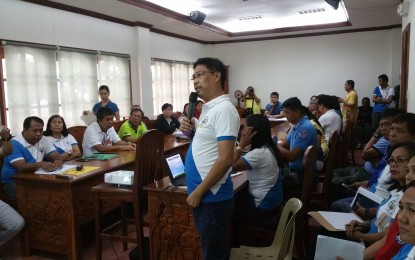
POST-DISASTER ASSESSMENT. Aurora PDRRMO head Amado Elson A. Egargue discusses updates on the impact of Typhoon Ompong in the province. (Photo by Jason de Asis)
BALER, Aurora — The Provincial Disaster Risk Reduction and Management Office (PDRRMO) has started conducting post-disaster needs assessment in areas affected by Typhoon Ompong on Saturday.
PDRRMO head Amado Elson A. Egargue said together with a composite team from the Office of Civil Defense-Region 3 (Central Luzon), they will personally visit the towns of Dinalungan, Casiguran and Dilasag -- known as DICADI area -- to conduct an assessment that would be used in crafting rehabilitation and recovery plan in the affected communities.
It can be recalled that DICADI area was under tropical cyclone warning signal No. 3 during "Ompong's" onslaught.
Egargue said as per directive of acting Governor and Provincial Disaster Risk Reduction and Management Council (PDRRMO) chairman Rommel Rico T. Angara, all concerned agencies were mobilized to gather and validate reports on the extent of damage caused by the typhoon for accuracy and transparency to the people of Aurora.
“All of the reports regarding the damages in infrastructure and agriculture coming from the municipal disaster risk reduction and management councils (MDRRMCs) are all subject for validation to prove the accuracy of their reports,” he said.
He added that they are preparing all the documents to report the effects of the typhoon at the session of the Sangguniang Panlalawigan (SP).
Latest data from PDRRMO showed that the total estimated cost of damage to agriculture and infrastructure reached PHP137.04 million.
At least 7,475 families or 27,763 individuals were affected in the province.
Out of the total figure, some 4,674 families or 17,738 individuals stayed in various evacuation centers while 2,801 families or 10,025 individuals were outside evacuation camps.
Egargue said the assistance provided to the affected families, particularly in the DICADI area, were 1,200 family food packs, 1,200 bottles of water and 198 water containers.
Also, 135 family food packs, 180 bottles of water from the provincial government of Aurora and hot meals for 190 persons from Philippine Red Cross (PRC) were given.
The Department of Social Welfare and Development (DSWD) also distributed family food packs.
Egargue said all roads leading to Aurora province are now passable and accessible.
“Our electricity and communications are stable and the province’s water tributaries are now in normal level,” he added. (PNA)
